A LOOK AT VIKTOR ORBAN'S DANUBE INSTITUTE
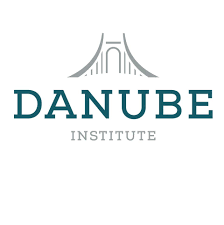
DANUBE INSTITUTE
The Danube Institute is a conservative think tank founded in 2013 and based in Budapest, Hungary. The institute is financed through the Batthyány Foundation (BLA) and receives Hungarian state funding from the Fidesz government. BLA is led by Hungarian Prime Minister Viktor Orban’s second-in-command Antal Rogán.
According to its mission statement, the Danube Institute is dedicated to "a respectful conservatism in cultural, religious, and social life, the broad classical liberal tradition in economics, and a realistic Atlanticism in national security policy."
The institute operates as one of the main international ideological workshops of the Fidesz government led by Prime Minister Viktor Orban. They have paid more than $1.64 million to its foreign collaborators over the past three years. The institute is building a network primarily with allies in the United States, together with the Heritage Foundation.
An agreement was signed between the Hungarian government’s proxies at the Danube Institute in 2022 and the Heritage Foundation. The agreement would allow for cooperation between the two organizations and co-host events together such as the Danube Institute - Heritage Foundation Geopolitical Summits.
Alarm bells began to sound when Orban visited the United States in 2024 prior to the presidential election. In a severe breach of diplomatic protocol, rather than meeting sitting President Biden in an official state visit, Orban went to visit Donald Trump at Mar-a-Lago.
That wasn't Orban's only stop in the United States. He did actually go to Washington D.C., to visit the Heritage Foundation headquarters were he gave a closed door speech. Orbán spoke, according to a readout, in front of an audience that “included renowned U.S. right-wing politicians, analysts and public personalities.”
The fact that Orban traveled to the Heritage Foundation HQ speaks to their power. It shows how much of a significant platform they are, as well as the network and reach they have developed. It also displays how far Orban's influence has penetrated into the United States' politics.
It reminds one of a detail revealed by Atlas Network founder Antony Sutton;
He sought out Hayek in London and talked enthusiastically about politics. Hayek, however, convinced him that think-tanks were the best medium for effecting change in society. It is safe to assume that Orban has adopted the same opinion as Hayek.
Using taxpayer money, Orban has financed ideological allies to network with, strategize with, increase influence abroad, and use as tools domestically to push his regimes ideas and propaganda.
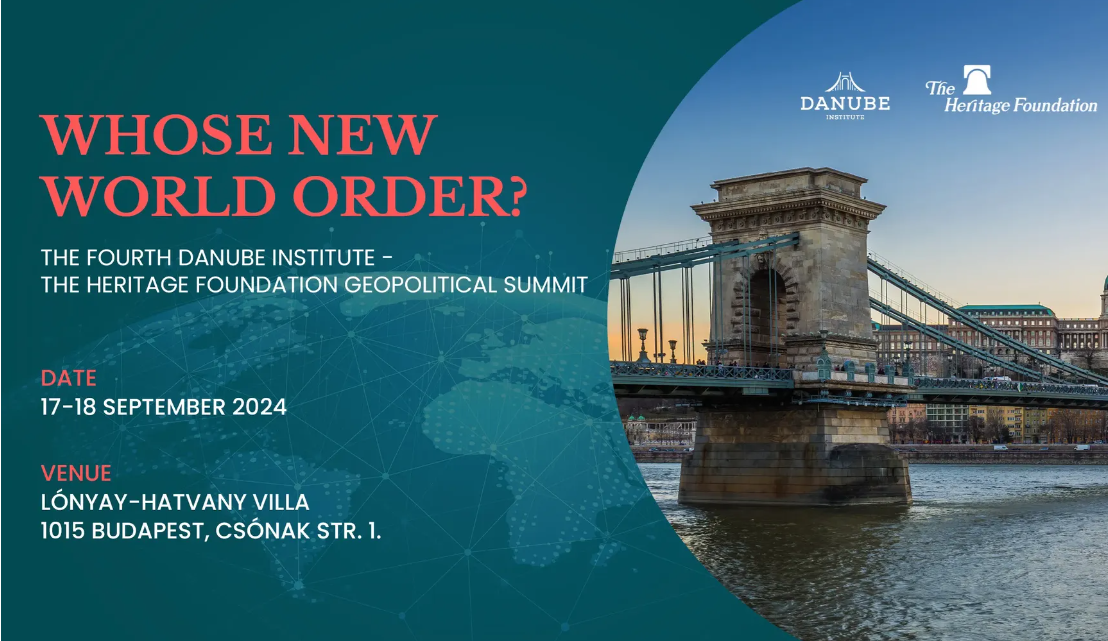
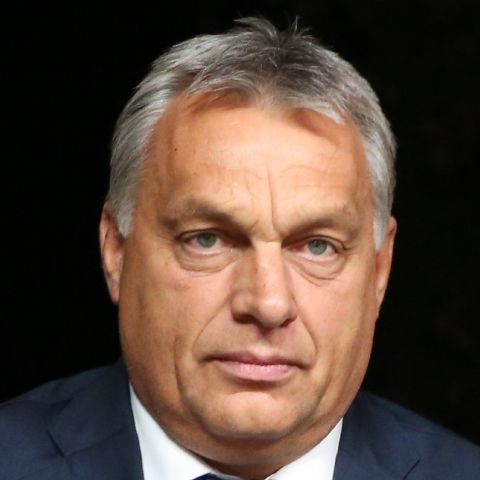
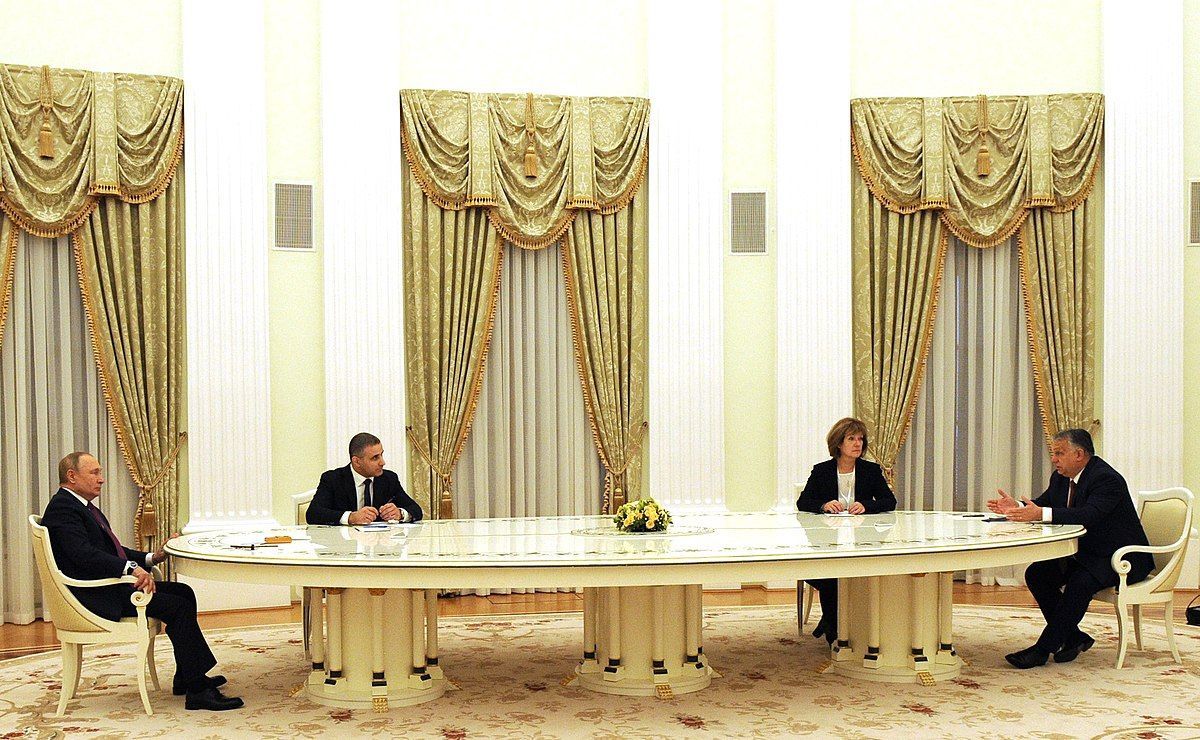
Russian President Vladimir Putin with Viktor Orbán in the Kremlin on 1 February 2022
VIKTOR ORBAN
During his current term as Prime Minister, Orban's policies have undermined democracy, weakened judicial independence, increased corruption, and curtailed press freedom in Hungary. His portrayal of the EU as a political foe—as he accepts its money and funnels it to his allies and relatives—has led to accusations that his government is a kleptocracy. It has also been characterized as a hybrid regime, dominant-party system, and mafia state.
His tenure has seen Hungary's government shift towards what he has called "illiberal democracy," while simultaneously promoting Euroscepticism and opposition to liberal democracy and establishment of closer ties with China and Russia.
In 2012 Orbán's government gave a huge tax break for the wealthy by introducing a flat tax on personal income set at 16%.
On 14 January 2014 Orbán went to Moscow in order to sign with Vladimir Putin an agreement on the Paks II nuclear power plant (NPP). The Russian state-owned enterprise Rosatom would develop the NPP, and Hungary was to finance the plant by borrowing from Russia. At the same time Orbán reassured everyone that the South Stream pipeline would be completed soon. The BBC complained that "there was no formal bidding process for the plant's expansion, and the terms of the loan agreement have not yet been made public," even after the Hungarian parliament approved the deal on 6 February. It later came to light that the loan amounted to €8bn and was financed over a 30 year term. Hungarian MFA Peter Szijjarto told reporters that the deal was "the business (transaction) of the century." Westinghouse and Areva, two Western prime contractors, had been lured since 2012 by the Hungarian civil service but eventually had been frozen out of competition by the Orbán government, who chose to sole-source the deal.
United States of America
Orbán and his government have gained favor with US president Donald Trump and his Republican administration (in stark contrast to the policy of isolation practiced by the preceding Obama Administration). Orbán was the first European head of government to endorse Trump's presidential bid during the 2016 United States presidential election.
Trump has praised Hungary's immigration policies in a discussion with Orbán. The more amiable attitude of the Trump Administration toward the Hungarian government prompted criticism and a protest by 22 Democratic Party lawmakers that called for a more disciplinary policy towards the country's government over what they perceived as a problematic track record.
Steve Bannon, former head of Breitbart News and a former close associate of President Trump who had an integral role in Trump's electoral campaign and administration, has also praised Orbán and announced plans to work with Fidesz in orchestrating the party's electoral campaign for the 2019 European parliament election.
Ukraine and tensions with EU
Orban,'s government has refused to send weapons to Kyiv while maintaining ties with Moscow, said "it is obvious that Ukraine on its own cannot stand on its feet."
Orban opposed EU sanctions on Russian oil and gas and refuses to allow EU or Nato military aid to enter Ukraine. He says supplying weapons to Kyiv just prolongs the agony.
Orban took the decision to veto a EU backed package of economic aid for Ukraine, because he says Hungarian taxpayers' money should not go against their own interests.
He says membership for Ukraine in the EU would be a disaster for EU, including Hungarian farmers. It would also take away cohesion funds from Hungarians and others.
He sees Ukraine not as a future EU member, but as a buffer-zone between the EU and Russia. It is a view not so different from Vladimir's Putin's vision of a "neutral, demilitarised" Ukraine.
In July 2024 Zelensky decided to shut down the overland pipeline transfer of petroleum products from Russia to Hungary. Orbán and his government protested this event strenuously. When Croatia suggested that Hungary could use the Adria pipeline, Orbán refused, and his foreign minister said that it was unreliable.
In October 2024, as the Premier of Hungary, he was invited to address the European Parliament as part of Hungary's six-month presidency of the European Council.. During the European Parliament session, Ursula von der Leyen criticized Orbán, accusing him of failing to support Ukraine and mismanaging Hungary's economy. She highlighted the contrast between Orbán's current stance and the bravery of Hungarian freedom fighters in 1956, questioning the rationale of blaming Ukraine for the war. Additionally, MEP Péter Magyar criticized Orbán's government for corruption and declining living standards
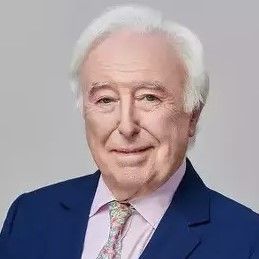
JOHN O'SULLIVAN
John O'Sullivan, CBE (born 25 April 1942) is a British conservative political commentator and journalist. From 1987 to 1988, he was a senior policy writer and speechwriter in 10 Downing Street for Margaret Thatcher when she was British prime minister and remained close to her up to her death. He served as a special adviser to Thatcher and was made a Commander of the Order of the British Empire (CBE) in the 1991 New Year's Honours List.
A former editor of National Review from 1988 to 1997, O'Sullivan has been an editor-at-large there since then, as well as being a Senior Fellow at the National Review Institute in Washington, D.C..
O'Sullivan served as vice president and executive editor of Radio Free Europe/Radio Liberty from 2008 to 2012 He was editor of the Australian monthly magazine Quadrant from 2015 to 2017.
O'Sullivan was the editor-in-chief of the international affairs magazine, The National Interest published by the Center for the National Interest (CNI) were he is a Senior Fellow, a public policy think tank based in Washington, D.C., The think tank and their members are covered in detail here.
O'Sullivan has been a featured panelist at the Atlantic Partnership. A An elite networking group set up by former Conservative Party leader Michael Howard to foster closer relations between the US and Europe, though its main impetus in Europe seems to have come from pro US forces in the UK including those with close links to NATO and other Atlanticist groups.
In 2013, O'Sullivan became first the director and then president of the Danube Institute, a Budapest-based think tank, for which he is paid an annual salary of 150,000 Euros, indirectly financed by the Hungary's Fidesz government.
O'Sullivan is also the Editor-at-Large for the Hungarian Conservative, another organ financed by the Hungarian taxpayers. The Batthyány Foundation (BLA) is their sponsor. BLA receives Hungarian state funding from the Fidesz government and is led by Hungarian Prime Minister Viktor Orbán’s second-in-command Antal Rogán. The Danube Institute is also financed by BLA.
O'Sullivan was the author of The President, the Pope, and the Prime Minister (Washington, D.C.: Regnery, 2006)(Conservative CIA publisher).
Roger Scruton praises O'Sullivan's book, which "forcefully" argues "that the simultaneous presence in the highest offices of Reagan, Thatcher and Pope John Paul II was the cause of the Soviet collapse. And my own experience confirms this."
O'Sullivan is the founder and co-chairman of the New Atlantic Initiative, an international organisation dedicated to reinvigorating and expanding the Atlantic community of democracies. The organisation was created at the Congress of Prague in May 1996 by Václav Havel and Margaret Thatcher.
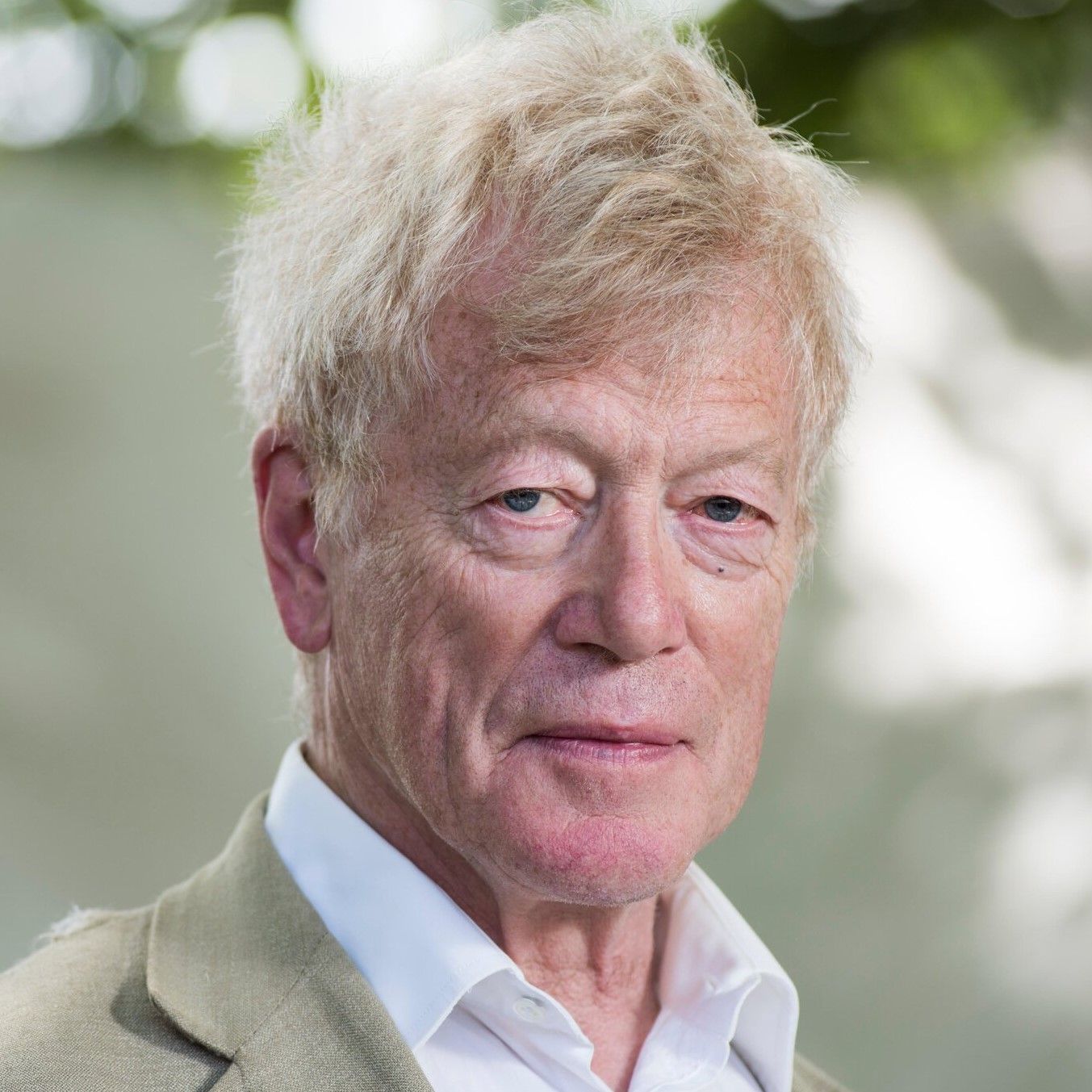
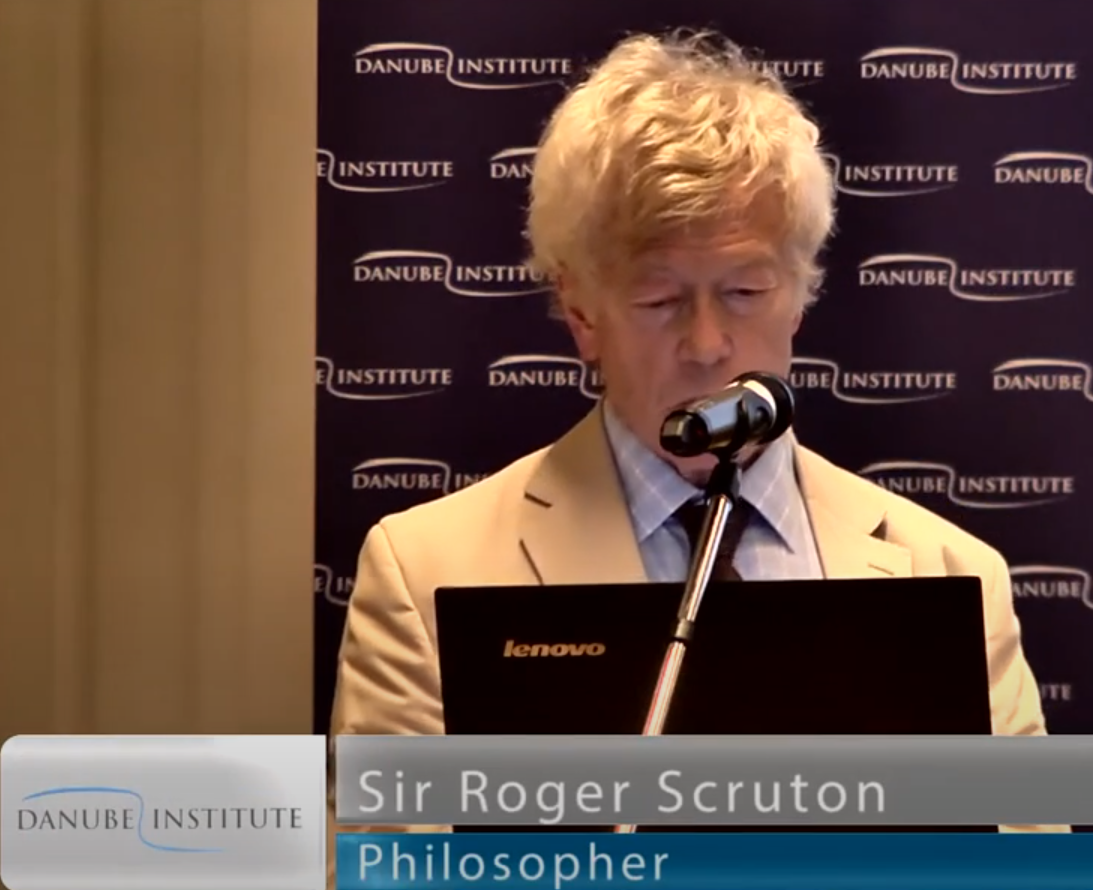
Scruton giving a speech at Danube Institute in 2016.
SIR ROGER SCRUTON d.2020
Sir Roger Vernon Scruton, FBA, FRSL was an English philosopher, writer, and social critic who specialised in aesthetics and political philosophy, particularly in the furtherance of conservative views.
Editor from 1982 to 2001 of The Salisbury Review, a journal championing conservatism in opposition to Thatcherism. The Review was set up by a group of Tories known as the Salisbury Group – founded in 1978 by Diana Spearman and Robert Gascoyne-Cecil – with the involvement of the Peterhouse Right.
Scruton wrote over 50 books on philosophy, art, music, politics, literature, culture, sexuality, and religion; he also wrote novels and two operas. His publications include The Meaning of Conservatism (1980), Sexual Desire (1986), The Aesthetics of Music (1997), and How to Be a Conservative (2014). He was a regular contributor to the popular media, including The Times, The Spectator, and the New Statesman.
Scruton was criticized in 2002 for having written articles about smoking without disclosing that he was receiving a regular fee from Japan Tobacco International (JTI, formerly R. J. Reynolds).
The tobacco controversy damaged Scruton's consultancy business in England. In part because of that, and because the Hunting Act 2004 had banned fox hunting in England and Wales, the Scrutons considered moving to the United States permanently, and in 2004 they purchased Montpelier, an 18th-century plantation house near Sperryville, Virginia.
Scruton held two part-time academic positions during this period. From 2005 to 2009 he was research professor at the Institute for the Psychological Sciences in Arlington, Virginia, a graduate school of Divine Mercy University; and in 2009 he worked at the American Enterprise Institute in Washington, D.C.
Soviet-controlled Eastern Europe
In the 1980s he helped to establish underground academic networks in Soviet-controlled Eastern Europe, for which he was awarded the Czech Republic's Medal of Merit (First Class) by President Václav Havel in 1998. Scruton was knighted in the 2016 Birthday Honours for "services to philosophy, teaching and public education".
He wrote in 2019 that "despite the appeal of the Poles, Hungarians, Romanians and many more, it is the shy, cynical Czechs to whom I lost my heart and from whom I have never retrieved it".
Scruton has become a mascot/deity figure within these taxpayer financed vessels of Fidesz such as the Danube Institute, Hungarian Conservative, and MCC.
A venue at the Hungarian Fidesz goverment financed MCC has been dedicated to Scruton named Scruton MCC. It is used as a restaurant and hosts speaking events sponsored by BLA. Scruton V.P. is a cafe in Budapest that is also named in his honor.
Just before his death, Scruton was awarded with the Hungarian Order of Merit, Commander's Cross with Star.It was presented to him by Hungarian Prime Minister Viktor Orbán in a ceremony in London.
Scruton's funeral was held on 24 January 2020 at Malmesbury Abbey with the attendance of several peers, Conservative politicians, and Hungarian Prime Minister Viktor Orbán.
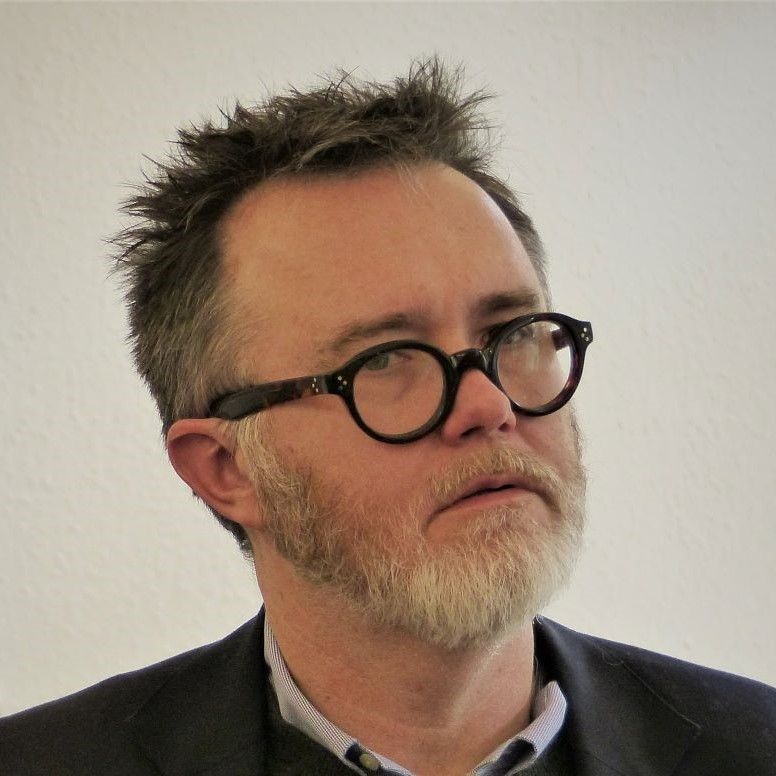
‘Ukraine is losing this war' - Rod Dreher 27.09.2024
ROD DREHER
Dreher is an American religious right writer and editor living in Hungary who has been described in recent times of having 'increasingly openly fascist sympathies'.
Dreher began his career as a television critic for Sun Myung Moon's The Washington Times, and later worked as chief film critic for the New York Post and an editor for National Review. He was also columnist with The American Conservative for 12 years, ending in March 2023.
Dreher’s stay in Hungary is financed, at least in part, by the Hungarian taxpayers. Last year, he was a visiting professor at Mathias Corvinus Collegium (MCC), an institution engaged in training future government cadres that operates from public funds provided by the government of Viktor Orbán. The Hungarian edition of Dreher’s most recent book, Live Not by Lies, was published by the MCC Press. And this year, Dreher is a visiting research fellow at the Danube Institute, a conservative think tank founded by the Hungarian government.
Dreher is so much of a puppet of the Hungarian regime he was ordered to rewrite one of his articles published on The American Conservative website
in early 2023. He left the media outlet shortly after being exposed by independent media in Hungary and Germany.
Since then Dreher is listed as a contributor to the unimaginatively named Hungarian Conservative, another organ financed by the Hungarian taxpayers. The Batthyány Foundation (BLA) is their sponsor. BLA receives Hungarian state funding from the Fidesz government and is led by Hungarian Prime Minister Viktor Orbán’s second-in-command Antal Rogán. The Danube Institute is also financed by BLA.
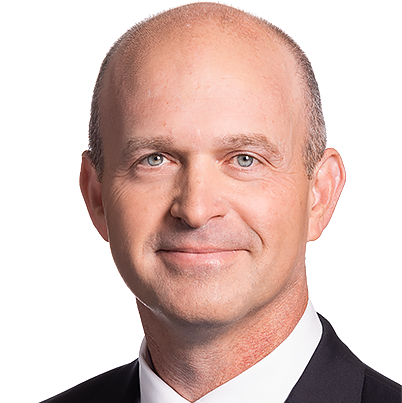
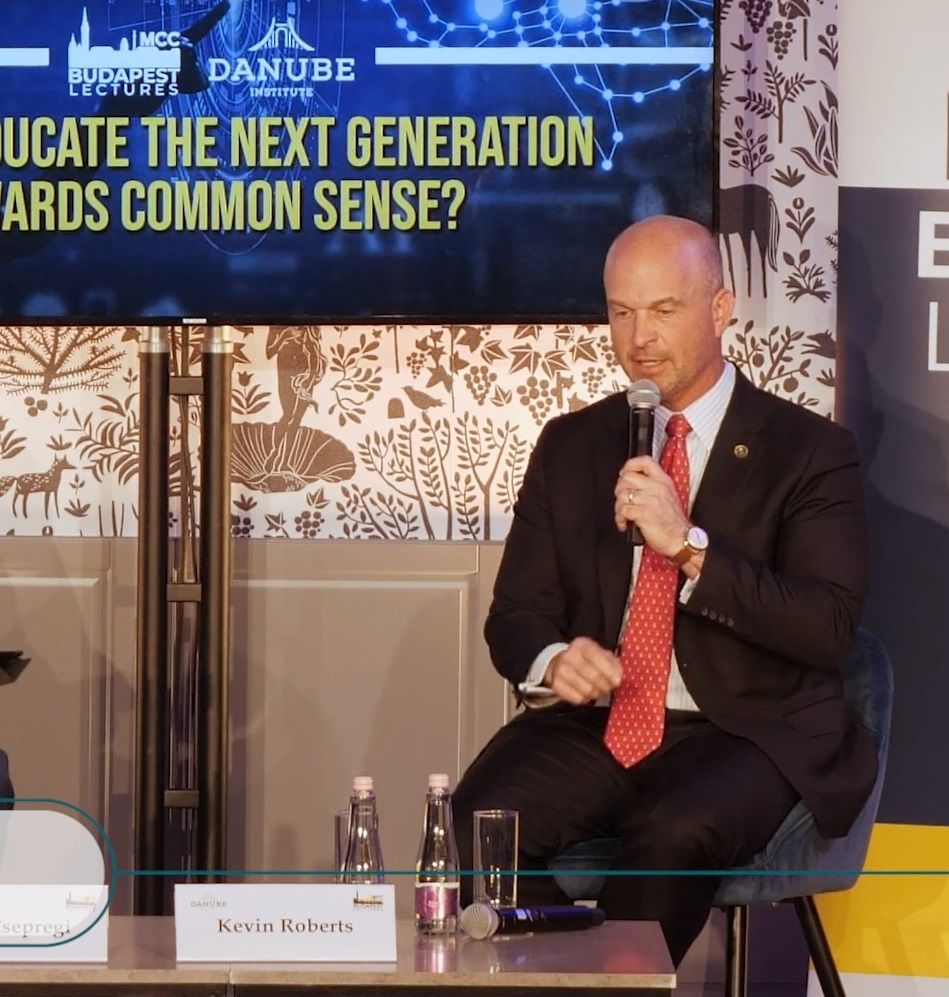
Kevin Roberts speaking at Mathias Corvinus Collegium (MCC in December 2022.
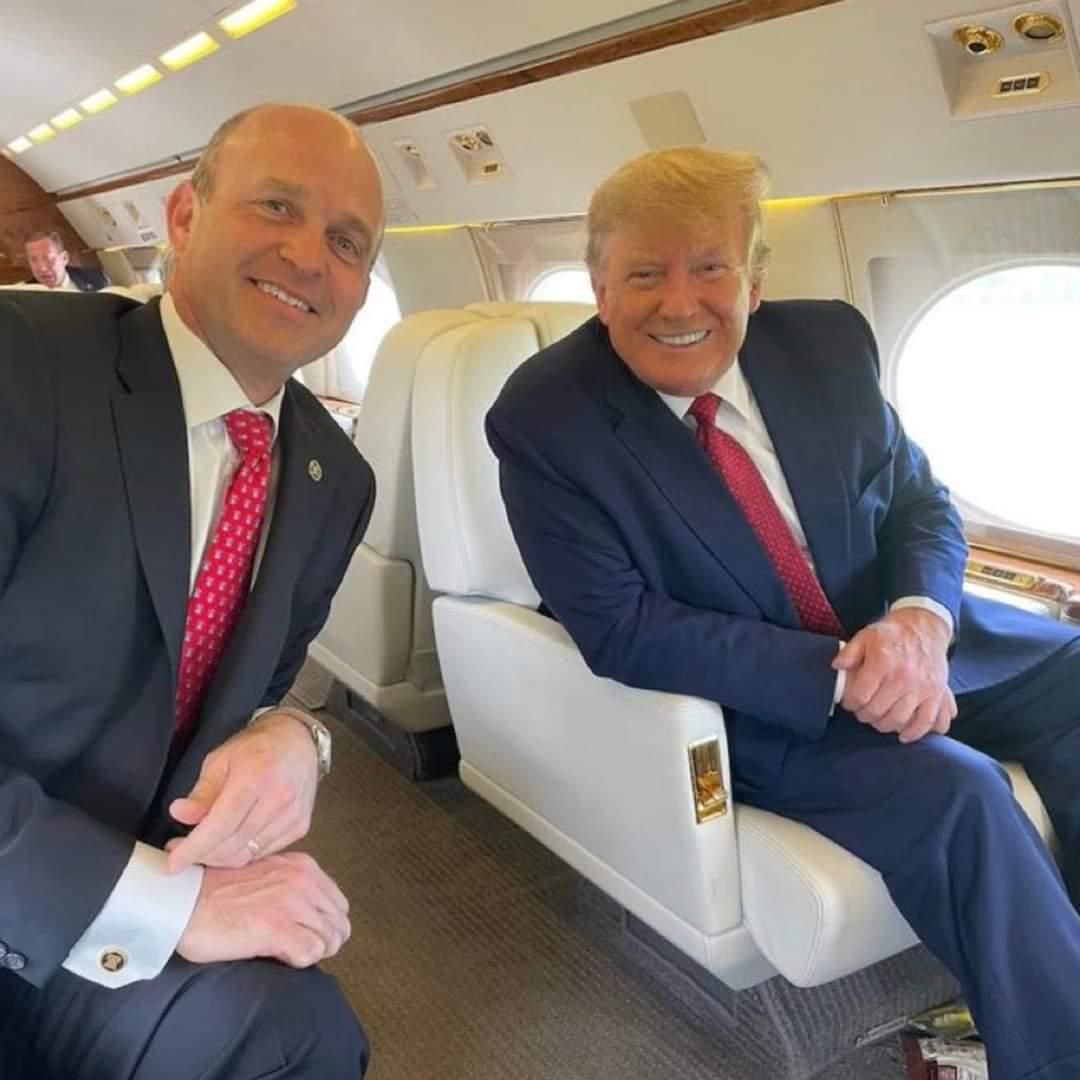
Roberts and Trump pictured together in 2022 on Trump's private jet.
KEVIN ROBERTS
Roberts was hired in 2016 by the Texas Public Policy Foundation, a major state thinktank aligned with conservatives in the state. He rose to lead the organization after Brooke Rollins, its former president, left to join the Trump administration.
During his time at the Texas foundation, Roberts solidified himself as a “Texas firebrand more determined to wage a divisive culture war; railing against any pandemic restrictions, critical race theory in schools and ‘teaching transgenderism to kindergartners,’” the Washington Post reported in 2022.
Despite his academic coursework on slavery, he vehemently rejects any diversity, equity and inclusion programs and teachings. And while in Texas, the Republican governor Greg Abbott named him to the “Texas 1836 Project advisory committee,” a committee set up to promote “patriotic education” and Texas’ founding.
Heritage Foundation named Roberts president in 2021, a rapid ascent in conservative politics. As president Roberts sees the organization's current role as "institutionalizing Trumpism." Studying and learning how Orban’has installed his 'lliberal state” is a perfect case study for Roberts to follow in order to achieve his goal.
Under Roberts' leadership an agreement was signed between the Heritage Foundation and the Hungarian government’s proxies at the Danube Institute in 2022. The agreement would allow for cooperation between the two organizations and co-host events together such as the Danube Institute - Heritage Foundation Geopolitical Summits.
At the end of 2022 on a visit to Budapest, Roberts was the featured speaker at an event at Mathias Corvinus Collegium (MCC), a private educational institute which received vast sums of public funds and was transformed into a training ground for young pro-Orban elites, hosted by Danube Institute.
This was followed up with another event at Mathias Corvinus Collegium (MCC) in early May 2023 were a Hertigate Foundation delegation including Kevin Roberts, Roger Severino,, Noah Weinrich, and Jonathan Butcher were invited to the Institute for Learning Research.
In 2024, when Orban made his visit to the Heritage Foundation headquarters, he reportedly had spoke in a closed door setting alongside Kevin Roberts and Vivek Ramaswamy in front of an audience that “included renowned U.S. right-wing politicians, analysts and public personalities.
Hungarian media outlet Atlatszo has uncovered Orban's influence network and has exposed that money has exchanged hands to people in Roberts' orbit.
In response to Trump's claim that he knew "nothing about it" regarding Project 2025, before going on and contradicting himself by stating "some of the things [Project 2025 says] are absolutely ridiculous and abysmal". The project's president, Kevin Roberts, said that no one at Project 2025 had "hard feelings" for Trump because they knew "he's making a political tactical decision there". Critics dismissed Trump's claims, pointing to the various people close to Trump who helped to draft the project, the many contributors who are expected to be appointed to leadership roles in a future Trump administration, his endorsement of the Heritage Foundation's plans for his administration in 2022, and the 300 times Trump himself is mentioned in the plans.
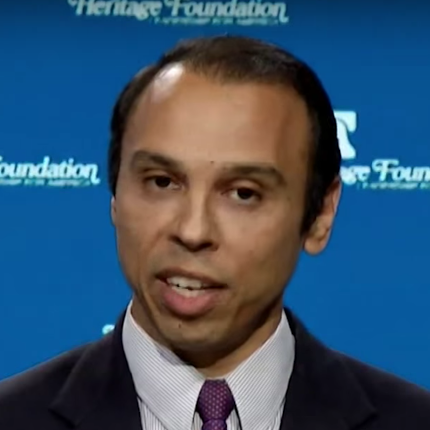
ROGER SEVERINO
Severino is Vice President of Domestic Policy and The Joseph C. and Elizabeth A. Anderlik Fellow at The Heritage Foundation. In 2015, Severino joined The Heritage Foundation, a conservative think tank geared towards public policy. There, he served as the director of the DeVos Center for Religion and Civil Society.
In 2023 Severino along with Heritage President Kevin Roberts. were invited to Budapest for a discussion on education at Mathias Corvinus Collegium (MCC) a private educational institute which received vast sums of public funds and was transformed into a training ground for young pro-Orban elites.
We've seen similarities develop in the United States with donor connected think tanks and conservative education institutions have a lot of crossover. One of the goals of Project 2025 Associate Directors Hemenway and Chretien involves networking with students on campuses to develop a tunnel system for graduates into the think tank sphere to be prepared for roles in government.
Severino authored the chapter on the Department of Health and Human Services in Project 2025's Mandate for Leadership were he outlined recommendations for the second Trump administration. After painfully reading the drivel this idiot contributed to the project I only hope, for the betterment of all US citizens, Severino is kept as far away from any policy decision making as he can be.
The implementation of Severino's plans would have serious consequences for healthcare and public health. His blueprint calls for a massive overhaul of the federal government, including health reforms that would deregulate health care, weaken the ACA, defund and privatize federal safety-net programs, and allow discrimination within (and beyond) healthcare settings.
According to a researchers at the School of Public Health’s Center for Health Law, Bioethics & Human Rights. “the playbook is built on numerous falsehoods about government, including how Medicare and Medicaid work, how federal law preempts conflicting state laws, and how law interacts with healthcare more broadly,” the authors write. “Although many of the proposals are unlawful, this would not likely deter a second Trump administration from implementing such policies.”
One major goal is to “return to the untenable pre-ACA status,” the authors write. The playbook details plans to achieve Republicans’ years-long goal to repeal the ACA, which would limit or remove health insurance coverage for millions of people and be replaced with insurance plans that lack many of the ACA’s signature protections, such as requiring coverage for essential health benefits, prohibiting exclusion based on preexisting conditions, and reducing prescription drug costs.
The authors also discuss how the playbook would privatize and defund aspects of the Medicare and Medicaid programs. Project 2025 proposes to deregulate Medicare Advantage—but also make it the default enrollment option that will result in huge amounts of taxpayer dollars being funneled to private health insurers.
Another of Severino's proposals includes imposing block grants and work requirements for Medicaid, which would result in loss of coverage for many patients.
In regards to abortion, Severino's plan is hellbent on the Trump Administration implementing draconian measures forcing pregnant women to carry to term, urging HHS to combat "abortion tourism" by cutting funds and mandating detailed abortion reporting by states. Presumably to track down woman who have traveled out of state for an abortion and prosecute them. Project 2025’s proposed federal mandate directly conflicts with strong legal protections for patient privacy in individual states.
Their blueprint also suggests limiting access to drugs like Mifepristone. Mifepristone is a drug that blocks a hormone called progesterone that is needed for a pregnancy to continue. Mifepristone, when used together with another medicine called misoprostol, is used to end a pregnancy through ten weeks gestation (70 days or less since the first day of the last menstrual period). But earlier this year the Supreme Court ruled unanimously to dismiss a case that challenged the FDA’s approval of mifepristone on these grounds (though the conservative-majority Court did leave the door open to future challenges). The Heritage Foundation’s plan seeks to have the FDA “stop promoting or approving mail-order abortions in violation of long-standing federal laws,” citing laws enacted as part of the Comstock Act, despite the fact that the U.S. Department of Justice has said such legislation does not apply to drugs that can be used to lawfully produce abortions.


TROUP CALHOUN HEMENWAY
Hemenway is a Senior Advisor at the Heritage Foundation and Associate Director for Personnel Placement on Project 2025 - preparing personnel for the next Trump administration.
In February 2024 at an event organized and promoted by the Danube Institute in Budapest, Hemenway discussed Project 2025's efforts to create the plans and identify the personnel to dismantle the administrative state under the next conservative administration.
Hemenway is the President of Personnel Policy Operations, who 'arm, prepare, and defend conservative, America First public servants.' The organization has a 'free speech' defense fund called Courage Under Fire Legal Defense Fund that was launched by Hemenway. He previously served in the Trump White House as Associate Director for National Security in the Office of Presidential Personnel, where his portfolio included the Departments of Defense, Homeland Security, Energy, and the Intelligence Community. Hemenway was a Senior Advisor to the Under Secretary of Defense for Research and Engineering in the Pentagon and a member of the Senior Executive Service, serving previously as a Defense Fellow and a Special Assistant in the Office of the Secretary of Defense.
Previously, he served as a member of the Presidential Transition Team and of the Trump Campaign policy team.
Hemenway is also a founder of the Association of Republican Presidential Appointees. ARPA looks to network with and politically organize current and past Republican appointees to help achieve their political outcomes.
Hemenway studied cybersecurity at the University of Virginia, graduating with high honors.
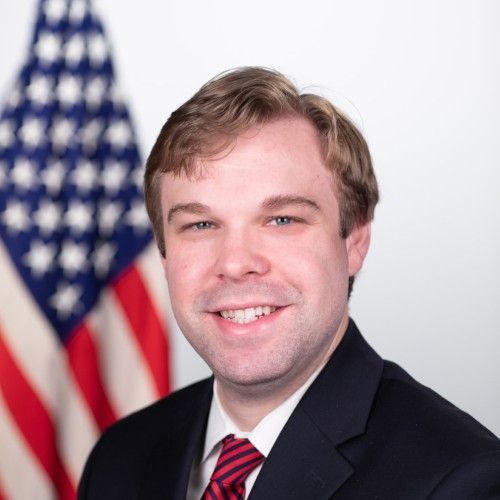
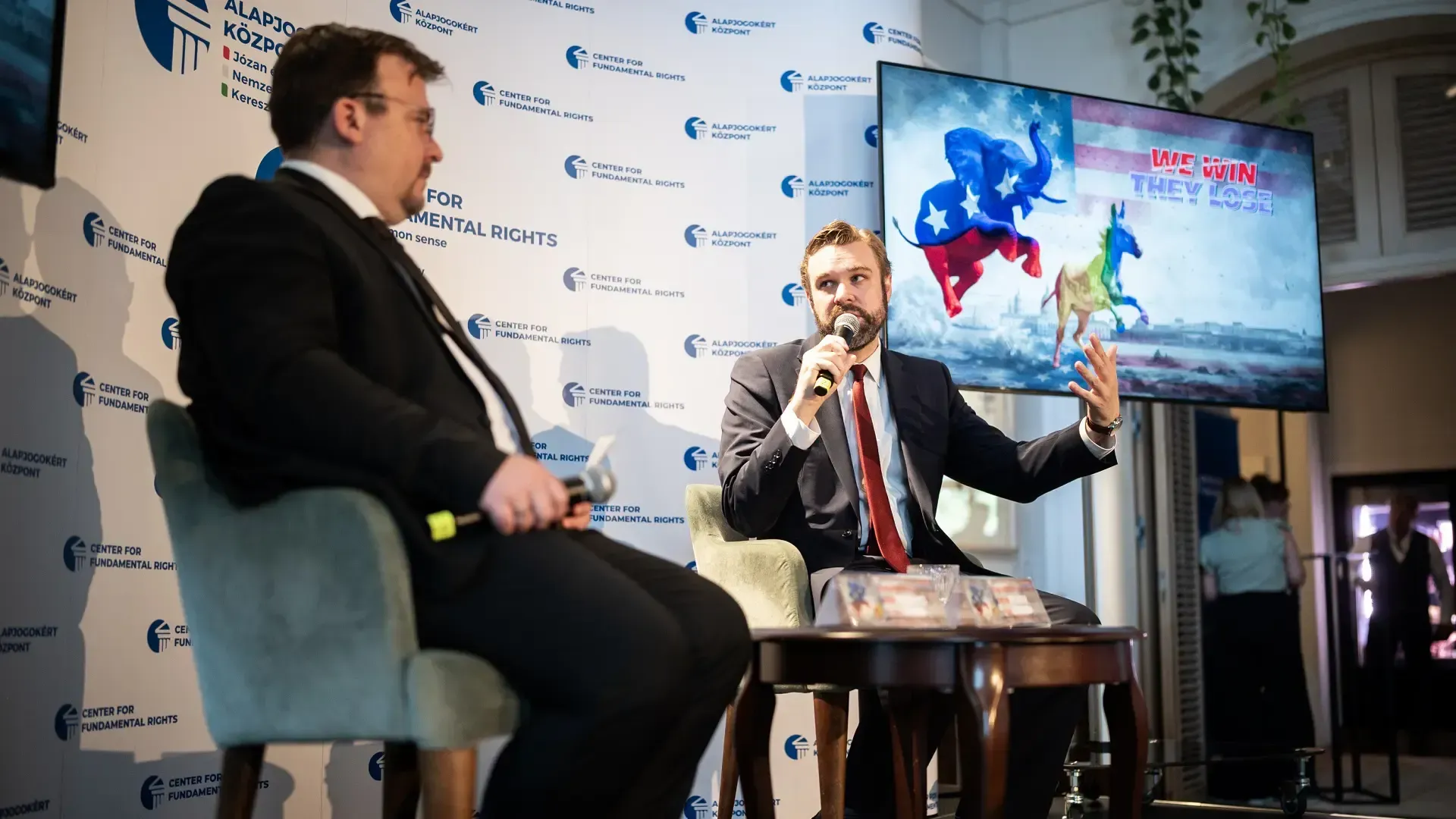
Spencer Chretien (R) of the Heritage Foundation and Zoltán Koskovics of the Center for Fundamental Rights.
SPENCER CHRETIEN
Chretien is an Associate Director of the 2025 Presidential Transition Project better known as Project 2025 at The Heritage Foundation. From 2020-2021, he served as a Special Assistant to President Donald J. Trump and Associate Director of Presidential Personnel, identifying people for key positions in the Trump administration.
In one of the leaked Project 2025 training videos, Spencer Chretien, offers his advice to political appointees. He stated that in a new conservative administration "loyalty and ideology are more important than professional experience”.
Chretien was previously involved in building ties between the Heritage Foundation and Hungary. In May 2024, the (Hungarian) Center for Fundamental Rights
– another state-funded organisation that exists mainly to praise Orban’s government – hosted representatives from the Heritage Foundation, including Chretien at an event entitled “We Win, They Lose – America’s Choice”. Chretien gave a presentation on Project 2025.
Back in the US, while networking with students, Chretien said the Heritage Foundation’s goal for Project 2025 is to turn conservatives into experts in government administration.
“A conservative president and his people are outmanned by the permanent bureaucracy that stays beyond one president,” Chretien said. “We’re always figuring out things a little bit too late, and we lose valuable time when we do have political power because we are still learning the ropes of the federal bureaucracy.”
Chretien said the Heritage Foundation has representatives from more than 50 partner organizations that comprise the Project 2025 advisory board, including Alliance Defending Freedom, Hillsdale College, Liberty University, and Patrick Henry College.
“The goal is to make what we’re doing so big that the next president cannot ignore it, and we can say to the next conservative president, ‘This is what the conservative movement has rallied behind. This is what the conservative movement expects and demands,’” Chretien said.
Project 2025 is conducting much of the next president’s work ahead of time. According to Chretien, Project 2025 also includes transition plans.
“We call it ‘the playbook, this is taking the big ideas and hashing them out: what needs to happen the day before the inauguration, on the day of the inauguration, all the way out to the first six months.”
“We’re going to take care of vetting these people who are in our database ahead of time so that the day after the election, we can say to the next president, ‘Here are appropriate, approved, pre-vetted personnel recommended by our whole advisory board who want to come to Washington and work for you,’” Chretien said.
On his mission to recruit college kids, Chretien said those who get involved in the transition project now will be favored when it comes time to hire the next Trump administration.
“Don’t be like all the people who get involved the day after the election, but get involved now,” Chretien said.
He has previously worked for other right-wing organizations part of this oligarchical infrastructure, including the American Legislative Exchange Council, Citizens against Government Waste and as Director of Programs at FreedomWorks.
Previously, Spencer was a political appointee at the Department of Housing and Urban Development.

MELISSA FORD MALDONANDO
Melissa Ford Maldonado is listed as a visiting fellow at Danube Institute. She is a senior fellow and policy director at the Texas Public Policy Foundation, the same foundation headed by Kevin Roberts before becoming President at the Heritage Foundation.
The Texas Public Policy Foundation is known primarily for its energy policy positions, denying that climate change is caused by human activity and arguing against the reduction of fossil fuels, which has received support from oil giants such as Exxon, Chevron and Koch Brothers.
The Texas Public Policy Foundation is also notable for its membership on the Project 2025 Advisory Board.
There she covers foreign policy, border security, public safety, drug cartels, and organized crime. Her work has been featured in publications including The Daily Caller, Washington Examiner, Newsweek, and The Hill.
Maldonado received some media attention when it was revealed via a Hungarian media outlet's request for information revealed a contract signed in 2024, stating that the visiting lecturer agreed write a 10-page paper “on Hungarian migration policy and lessons learned for the state of Texas” for $8,400."
In September 2024, a paper on this topic titled 'Hungary & Texas: A Comparative Perspective' was published on the Danube Institute website, authored by Maldonado.
Before joining TPPF, Maldonando served in the White House under President Donald Trump, working in the Office of American Innovation and the Domestic Policy Council. Following her tenure at the White House, she became an executive advisor at the Center for Advancing Opportunity, a research and education initiative in Washington D.C. Melissa is an alumna of the Bill Archer Fellowship in Washington D.C. and Fundación Disenso's 'Jóvenes Líderes de la Iberosfera' program. Born and raised in Cochabamba, Bolivia, she moved to Texas for college, graduating from the University of Texas at Tyler in 2018 with bachelor's degrees in Economics and Political Science.
